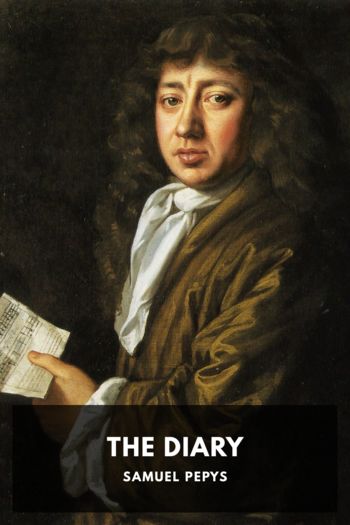The Diary, Samuel Pepys [e reader books TXT] 📗

- Author: Samuel Pepys
Book online «The Diary, Samuel Pepys [e reader books TXT] 📗». Author Samuel Pepys
In De Foe’s History of the Plague, he imagines a like case:
“Another ran about naked, except a pair of drawers about his waist, crying day and night, like a man that Josephus mentions, who cried, Woe to Jerusalem! a little before the destruction of that city. So this poor naked creature cried, O, the great and the dreadful God! and said no more, but repeated those words continually, with a voice and countenance full of horror, a swift pace, and nobody could ever find him to stop, or rest, or take any sustenance, at least that ever I could hear of. I met this poor creature several times in the streets, and would have spoke to him, but he would not enter into speech with me or any one else; but held on his dismal cries continually.”
De Foe had probably heard of the Quaker. —B. ↩
John Vaughan, M.P. for Cardiganshire. —B. ↩
See November 26th, 1666. ↩
Baronet, of Sleaford, Lincolnshire, and one of the proposed Knights of the Royal Oak for that county. —B. ↩
Sir Henry Bellasys, K.B., was member for Great Grimsby, in which seat he was succeeded by Sir Fretcheville Holies. ↩
Gilbert Sheldon. It is difficult to deal in a short note with such an infamous charge as this. It is impossible to leave it unnoticed, and yet to acknowledge it as one necessary to be refuted almost seems an insult to the archbishop’s memory. It will be observed that this is all pure gossip, and the mere scandal of those who hate to acknowledge that others are better than themselves. Archbishop Sheldon had bitter enemies, but there is no hint of immorality given by any of them. Professor Montagu Burrows has well vindicated Sheldon’s character in his valuable work on the Worthies of All Souls. He tells me that he overlooked the scandal recorded by Pepys, and therefore did not notice it in his book. He writes:
“I know of nothing like a confirmation, nor did Pepys seem to have any proof whatever. In such cases we can only quote the character given by his friends and acquaintances, as you see I have done, without knowing this story. It is quite incredible.”
↩
Henry Glemham, D.D., installed Dean of Bristol, 1660. He was elected Bishop of St. Asaph, February 7th, 1666–67, and died January 17th, 1669–70. ↩
Lincoln was vacant by the translation of Benjamin Laney to Ely, on the 24th of May, previously. William Fuller, Bishop of Limerick, was elected Bishop of Lincoln on the 17th September following. —B. ↩
Dr. Edward Rainbow was Bishop of Carlisle from 1664 to 1684. —B. ↩
Edward Pepys, of Broomsthorpe, who married Elizabeth Walpole. The author’s own wife could not be included amongst the plain women whom the Pepyses married?—it is otherwise well for his domestic peace that he wrote in cipher. —B. ↩
Henry Jermyn, created Baron Dover of Dover in 1685, and Earl of Dover by James II in 1689. ↩
Mary, Countess of Falmouth, remarried Charles, Lord Buckhurst, afterwards the sixth Earl of Dorset. Jermyn married Jane, daughter of Sir Edward Foley. ↩
John Egerton, second Earl of Bridgewater. ↩
Edward, second Earl of Manchester. ↩
See 27th of this month. ↩
In the play of Epicene, or the Silent Woman, Mrs. Otter thus addresses her henpecked husband, Thomas Otter—
“Is this according to the instrument when I married you, that I would be princess and reign in my own house, and you would be my subject, and obey me?”
act ii, scene 1—B. ↩
The Lord Mayor’s Banqueting House, where the Lord Mayor and Corporation dined after their periodical visits to the Bayswater and Paddington conduits and the Conduit Head adjacent to the Banqueting House. Stratford Place, Oxford Street, was built on the site about 1775. ↩
King Edward VI, on June 28th, 1 Edw. VI, granted the “House of Neate” to Sir Anthony Browne. Stow’s Continuators describe this place as “a parcel of houses taken up by gardeners for planting of asparagus,” etc. They were situated on the low ground by the Thames side west of Vauxhall Bridge. The ground was raised by the transportation of the soil from St. Katherine’s when the docks were made, and now the parish of St. Gabriel’s, Pimlico, occupies the site of the Neat Houses. ↩
Within the hollow of the trunk of Sir Philip Sidney’s oak at Penshurst, celebrated by several of our poets, was a seat which contained five or six persons with ease and convenience. Pepys probably means a summerhouse erected in the branches. A few years since one existed near Beckenham, in Kent. —B. ↩
Evelyn heard Signor Francisco play on the harpsichord on December 2nd, 1674. He wrote that the signor was “esteemed one of the most excellent masters in Europe on that instrument” (Diary). ↩
“Sept. 6, 1667. John Clarke to James Hickes. A vessel arrived from Harwich brings news that the English lost 600 to 700 men in the attempt on St. Christopher; that Sir John Harman was not then there, but going with 11 ships, and left a ketch at Barbados to bring more soldiers after him; that





Comments (0)